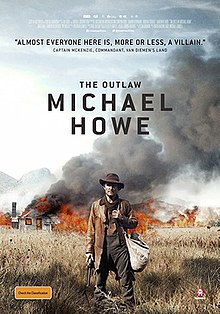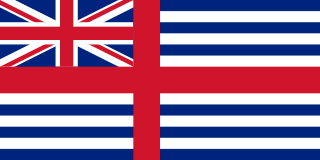
Van Diemen's Land was the colonial name of the island of Tasmania used by the British during the European exploration and colonisation of Australia in the 19th century. The island was previously discovered and named by the Dutch in 1642. Explorer Abel Tasman discovered the island, working under the sponsorship of Anthony van Diemen, the Governor-General of the Dutch East Indies. The British retained the name when they established a settlement in 1803 before it became a separate colony in 1825. Its penal colonies became notorious destinations for the transportation of convicts due to the harsh environment, isolation and reputation for being inescapable.

Bushrangers were armed robbers who hid from authorities in the bush of the British colonies in Australia. The earliest use of the term applied to escaped convicts in the early years of the British settlements in Australia. By the 1820s, the term had evolved to refer to those who took up "robbery under arms" as a way of life, using bases in the bush.
The history of Tasmania begins at the end of the Last Glacial Period when it is believed that the island was joined to the Australian mainland. Little is known of the human history of the island until the British colonisation of Tasmania in the 19th century.

Risdon Cove is a cove located on the east bank of the Derwent River, approximately 7 kilometres (4 mi) north of Hobart, Tasmania. It was the site of the first British settlement in Van Diemen's Land, now Tasmania, the island state of Australia. The cove was named by John Hayes, who mapped the river in the ship Duke of Clarence in 1794, after his second officer William Bellamy Risdon.

The Macquarie Harbour Penal Station, a former British colonial penal settlement, established on Sarah Island, Macquarie Harbour, in the former colony of Van Diemen's Land, now Tasmania, operated between 1822 and 1833. The settlement housed male convicts, with a small number of women housed on a nearby island. During its 11 years of operation, the penal colony achieved a reputation as one of the harshest penal settlements in the Australian colonies. The former penal station is located on the eight-hectare (twenty-acre) Sarah Island that now operates as a historic site under the direction of the Tasmania Parks and Wildlife Service.
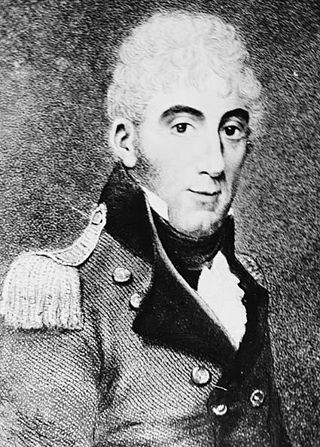
Colonel David Collins was a British Marine officer who was appointed as Judge-Advocate to the new colony being established in Botany Bay. He sailed with Governor Arthur Phillip on the First Fleet to establish a penal colony at what is now Sydney. He became secretary to the first couple of Governors, later being appointed to start a secondary colony where he founded the city of Hobart as the founding Lieutenant Governor of Van Diemen's Land.
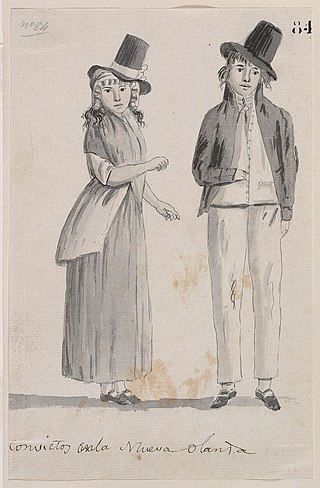
Between 1788 and 1868 the British penal system transported about 162,000 convicts from Great Britain and Ireland to various penal colonies in Australia.

William Sorell was a soldier and third Lieutenant-Governor of Van Diemen's Land.
The following lists events that happened during 1804 in Australia.
The following lists events that happened during 1812 in Australia.

Brendan Cowell is an Australian actor and writer.
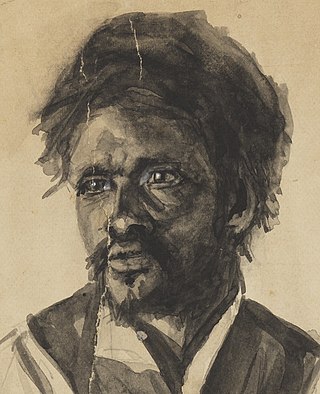
Musquito was an Indigenous Australian resistance leader, convict hunter and outlaw based firstly in the Sydney region of the British colony of New South Wales and later in Van Diemen's Land.
Michael Howe was a British convict who became a notorious bushranger and gang leader in Van Diemen's Land, Australia.

Thomas Davey was a New South Wales Marine and member of the First Fleet to New South Wales, who went on to become the second Lieutenant Governor of Van Diemen's Land.

Nial William Fulton is an Australian film and television director, producer and writer. Focused on social justice issues, his works include investigative documentaries Revelation, Hitting Home, Borderland, The Queen & Zak Grieve and Firestarter: The Story of Bangarra.

Tasmanian Gothic is a genre of Tasmanian literature that merges traditions of Gothic fiction with the history and natural features of Tasmania, an island state south of the main Australian continent. Tasmanian Gothic has inspired works in other artistic media, including theatre and film.
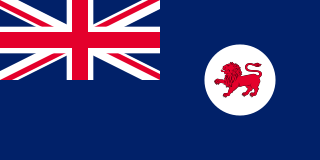
The Colony of Tasmania was a British colony that existed on the island of Tasmania from 1856 until 1901, when it federated together with the five other Australian colonies to form the Commonwealth of Australia. The possibility of the colony was established when the Parliament of the United Kingdom passed the Australian Constitutions Act in 1850, granting the right of legislative power to each of the six Australian colonies. The Legislative Council of Van Diemen's Land drafted a new constitution which they passed in 1854, and it was given royal assent by Queen Victoria in 1855. Later in that year the Privy Council approved the colony changing its name from "Van Diemen's Land" to "Tasmania", and in 1856, the newly elected bicameral parliament of Tasmania sat for the first time, establishing Tasmania as a self-governing colony of the British Empire. Tasmania was often referred to as one of the "most British" colonies of the Empire.
Andrew Bent was a printer, publisher and newspaper proprietor, active in Australia. He established the first successful newspaper in Tasmania, was the first Australian newspaperman to print a newspaper free from government control, and the first Australian printer to be imprisoned for libel.

The Lady Outlaw is a 1911 Australian silent film set in Van Diemen's Land during convict days.

In Films is an Australian independent television production company. It specialises in social justice documentaries and is known for Hitting Home and Revelation; the US series Borderland; and Firestarter: The Story of Bangarra.
